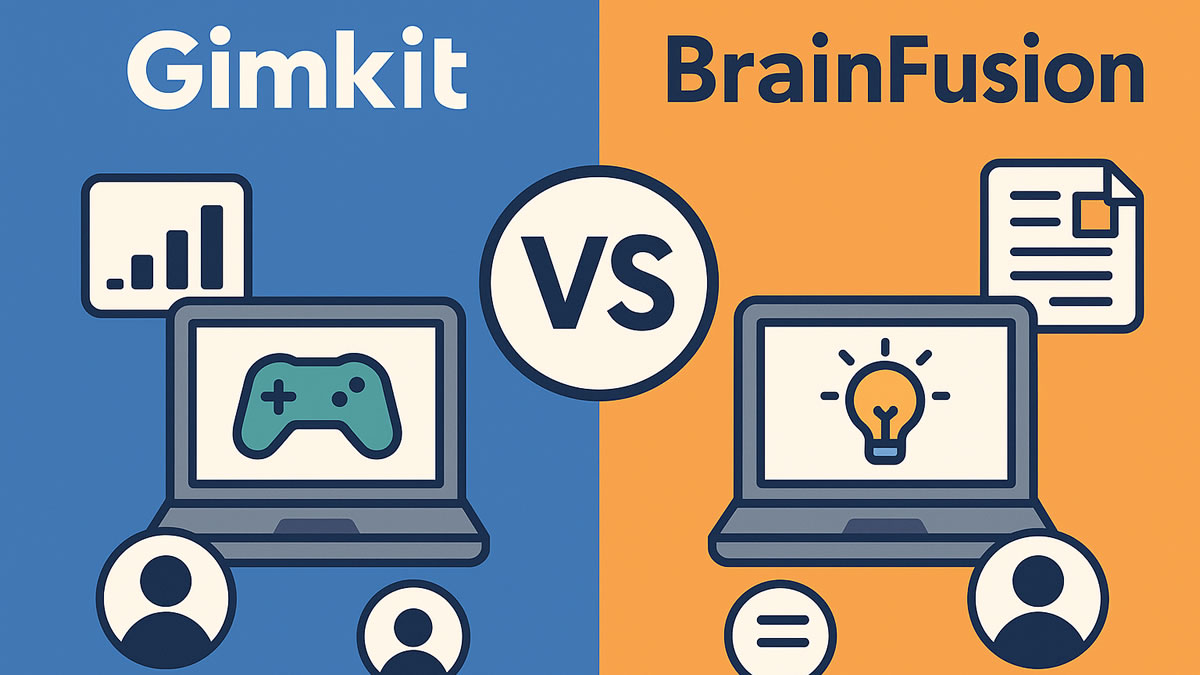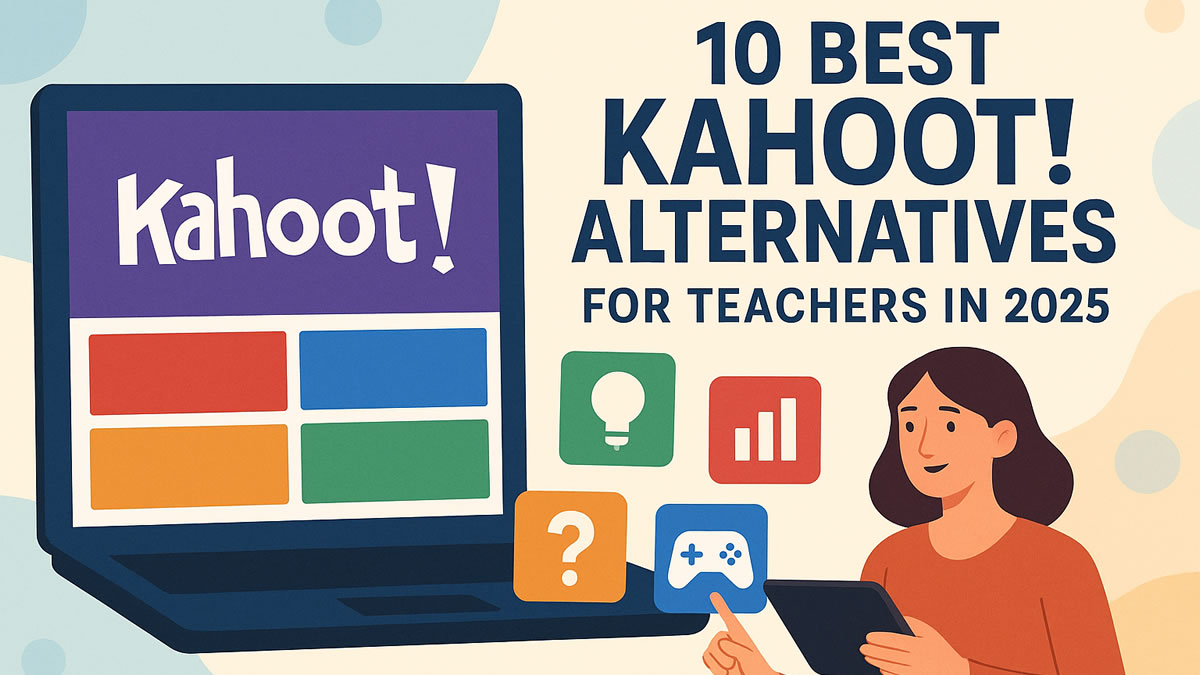Gimkit vs. BrainFusion: Which Is Better for Classrooms in 2025?
Gimkit has become a middle school favorite with its fast-paced game modes, virtual currency, and unique strategy-based loops. But as teachers look for tools that offer better analytics, AI-assisted content creation, and low-prep review options, many are exploring alternatives like BrainFusion Games.
If you’re wondering which platform fits your classroom best in 2025, this guide breaks down pricing, gameplay, analytics, AI features, classroom fit, and which tool is better for different grade levels and use cases.
Let’s dive in.
Why Teachers Compare Gimkit and BrainFusion
Both platforms offer multiplayer learning games, but they solve different teacher priorities:
- Gimkit is known for high student engagement and arcade-style modes.
- BrainFusion focuses on fast content creation, multiple game formats from one question set, and actionable reporting.
In 2025, teachers are asking for:
- Time-saving AI tools
- Strong analytics for reteaching
- Fresh gameplay that doesn’t require rebuilding questions
- Easy join codes without student accounts
- Affordable pricing
Understanding these differences helps you choose the right tool for your classroom.
Feature Comparison at a Glance
Below is a high-level breakdown before we explore each category in detail.
| Feature | Gimkit | BrainFusion |
|---|---|---|
| AI Question Generation | ❌ No | ✔ Yes (high-quality, fast) |
| Game Modes | ✔ High-energy, strategy-based | ✔ Multiple formats from one dataset |
| Analytics Quality | Medium | High (question-level insights) |
| Pricing | Higher | Lower, budget-friendly |
| Student Accounts Required | Sometimes (homework modes) | ❌ Never |
| Import From Notes/Docs | ❌ No | ✔ Yes (paste text or upload content) |
| Ideal For | Engagement, middle school energy | Fast prep, mastery, insights |
Gameplay & Student Engagement
⭐ Gimkit: High-Energy Strategy Modes
Gimkit is famous for modes like:
- Tag
- Fishtopia
- The Floor Is Lava
- Trust No One
Students earn virtual currency with correct answers, then buy power-ups, upgrades, or sabotage tools depending on the mode.
Strengths:
- Extremely engaging, especially for grades 5–9
- Seasonal events keep things fresh
- Students adore the game loops
Limitations:
- Content sometimes takes a backseat to gameplay
- Strategy can overshadow mastery
- Requires periodic mode rotation to avoid burnout
⭐ BrainFusion: Gameplay + Mastery
BrainFusion’s approach blends variety with learning science:
- Quiz Quest (fast-paced quizzes)
- Artifact Adventure (exploration-based learning)
- Ninja Fruit Frenzy (speed and reflex)
- Flashcard Fusion (spaced repetition)
- Conjugation Practice (specialized language mode)
The key strength?
Create once, play many ways.
You build a single question set and instantly switch between modes without recreating anything.
Benefits:
- Reduces prep time
- Keeps students motivated with fresh gameplay
- Supports mastery through research-backed approaches
Content Creation & Teacher Workflow
⭐ Gimkit: Manual Creation
Gimkit offers a straightforward editor, but:
- All questions must be entered manually
- No AI assistance
- No import from documents or existing notes
- Re-authoring is required for new modes or variations
This can be time-consuming for teachers with limited prep time.
⭐ BrainFusion: AI-Powered & Teacher-Friendly
BrainFusion is built for speed:
- Paste a lesson, notes, or standards → get instant questions
- Upload a document or CSV file
- Edit questions manually anytime
- Mix topics with the interleaved game builder
If you need a warmup, review game, exit ticket, or study set, you can generate one in under a minute.
💡 Pro Tip
Use BrainFusion's AI prompt templates like “5-question exit ticket on simplifying expressions” to generate mastery-focused quick checks in seconds.
Analytics & Insights
⭐ Gimkit: Light to Moderate Analytics
Gimkit offers:
- Student accuracy
- Game results
- Some question-level info depending on mode
Useful, but not robust enough for mastery tracking or planning instruction.
⭐ BrainFusion: Data That Teaches For You
BrainFusion’s reporting includes:
- Question-level performance
- Missed-question breakdowns
- Session summaries
- Trends across multiple plays
- Exportable results
This makes it ideal for:
- Reteaching plans
- Differentiated instruction
- MTSS/RTI
- Parent communication
If your school emphasizes data-driven instruction, BrainFusion stands out.
Pricing (2025)
Pricing changes frequently across EdTech, but based on current teacher feedback and public info:
⭐ Gimkit Pricing
- Higher cost than most classroom game tools
- Annual subscription required for full access
- Limited free functionality
- Student accounts for homework modes
Teachers often love the product but find it hard to justify the price.
⭐ BrainFusion Pricing
BrainFusion takes a budget-friendly approach:
- Free plan (5 games + 3 AI credits)
- Paid plans start low ($4.99/mo after first month)
- AI credits never expire
- Unlimited games on all paid plans
- No student accounts
Perfect for individual teachers, departments, and small budgets.
🎮 Try BrainFusion Free
See why teachers choose BrainFusion for daily instruction. Start with 5 free games and 3 AI credits—no credit card required.
Start Free →Classroom Fit: Who Should Use Which?
⭐ Choose Gimkit if you want:
- High-energy gameplay
- Strategy-heavy loops students love
- Middle school audience engagement
- Occasional special events
Best for:
Grades 5–9, Friday games, celebrations, high-energy reviews.
⭐ Choose BrainFusion if you want:
- Fast AI generation
- Question-level data
- Multiple game modes from one dataset
- No student accounts
- A tool that enhances daily instruction
Best for:
All grade levels, but especially:
- Teachers with limited prep time
- Language teachers
- Test prep
- Daily warmups & exit tickets
- Mastery-focused classrooms
Real-World Examples
Example 1 — Middle School Science
Teacher Need: High engagement before a unit test
- Gimkit: Great for a “big review day”
- BrainFusion: Better for daily warmups, exit tickets, and targeted reteach
Example 2 — High School Math
Teacher Need: Identify misconceptions quickly
- Gimkit: Fun, but limited data
- BrainFusion: Strong question-level reporting for planning next lessons
Example 3 — World Languages
Teacher Need: Audio, conjugation practice, repetition
- Gimkit: Lacks language-specific tools
- BrainFusion: Audio support + dedicated conjugation mode
Final Verdict: Gimkit vs. BrainFusion in 2025
Both platforms are excellent — they simply solve different problems.
Choose Gimkit for:
- High-engagement game days
- Strategy-based, arcade-style play
- Motivating middle schoolers with fun modes
Choose BrainFusion for:
- Fast, AI-powered content creation
- Daily instruction support
- Better data and mastery
- Multiple game types without reauthoring
- Budget-friendly pricing
Most teachers find the best approach is both:
Gimkit for celebrations and high-energy days — BrainFusion for everything that supports learning day-to-day.
Try BrainFusion Free
Try BrainFusion for Your Next Review Game
Create an AI-generated game in under 60 seconds and see instant question-level insights.




